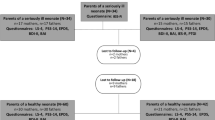Abstract
The emotional and social development of full term infants who required major neonatal surgery were compared prospectively over 3 years with those of a matched group of healthy infants. Ratings of the mother-child relationship and attachment ratings at 12 months indicated that in the short-term there was no evidence of any adverse effects of early hospitalization. At 3 years of age however, the children in the surgical group as a whole showed an increased incidence of behaviour problems, and there was a higher rate of difficulties in the mother-child relationship compared with the controls. Within the surgical group, a combination of a lengthy first admission, repeat admissions, and family and social factors were associated with this increased rate of emotional and behavioural difficulties.
Résumé
Le développement affectif et social d'enfants à termes qui nécessitent une intervention chirurgicale néo-natale majeure furent comparés prospectivement sur 3 ans avec celui d'un groupe témoin d'enfants sains. Les scores d'attachement et de relation mère-enfant à 12 mois montraient qu'à cours terme il n'y avait pas d'évidence d'un effet négatif de l'hospitalisation précoce. Cependant à 3 ans, les enfants du groupe chirurgical en tant qu'ensemble montrait une incidence accrue de problémes comportementaux et avaient un taux plus importants de difficultés dans la relation mère-enfant comparés avec le groupe témoin. A l'intérieur du groupe chirurgical, la combinaison d'une première admission plus longue, d'admissions répétées, ainsi que des facteurs familiaux et sociaux étaient associés avec un taux plus élévé de difficultés affectives et comportementales.
Zusammenfassung
Die psychische und soziale Entwicklung von termingerecht geborenen Säuglingen, die in der Neonatalzeit größeren chirurgischen Eingriffen ausgesetzt waren, wurde prospektiv über einen Zeitraum von 3 Jahren mit einer parallelisierten Stichprobe von 12 gesunden Säuglingen verglichen. Beurteilungen der Mutter-Kind-Bezichungen und Bewertungen der Anhänglichkeit nach 12 Monaten ergaben, daß über diesen kurzen Zeitraum keine nachteiligen Auswirkungen der frühen Behandlungen offensichtlich waren. Im Alter von 3 Jahren zeigte die Gruppe der operierten Kinder eine höhere Inzidenz an Verhaltensauffälligkeiten, und es fand sich eine höhere Rate an Schwierigkeiten in der Mutter-Kind-Beziehung im Vergleich zu den Kontrollkindern. Innerhalb der chirurgischen Gruppe waren eine Kombination von langandauernder stationärer Erstbehandlung, wiederholten Aufnahmen, familiären und sozialen Faktoren mit dieser erhöhten Rate an psychischen Problemen und Verhaltensauffälligkeiten korreliert.
Similar content being viewed by others
References
Ainsworth, M. & Wittig, B. (1969). Attachment and exploratory behaviour of one-year-olds in a strange situation. In B. Foss (Ed.),Determinants of Infant Behaviour. New York: Barnes & Noble.
Carey, W.B. & McDevitt, S.C. (1978). Revision of the infant temperament questionnaire.Paediatrics, 61, 735–739.
Douglas, J. W. B. (1975). Early hospital admissions and later disturbances of behaviour and learning.Developmental Medicine and Child Neurology, 17, 456–480.
Earls, F. (1980). Prevalence of behaviour problems in three year old children.Archives of General Psychiatry, 37, 1153–1157.
Elmer, E. & Gregg, G. S. (1967). Developmental characteristics of abused children.Pediatrics, 40, 596–602.
Fullard, W., McDevitt, S. C. & Carey, W. B. (1984). Assessing temperament in one- to three-year-old children.Journal of Pediatric Psychology, 19, 205–217.
Griffiths, R. (1954).The Abilities of Babies. London: University of London Press.
Goldberg, D., Cooper, B., Eastwood, M. R., Kedward, M. B. & Shepherd, M. (1970). A standardised psychiatry interview for use in community surveys.British Journal of Preventive and Social Medicine, 24, 18–23.
Jenkins, S., Owen, C., Bax, M. & Hart, H. (1984). Continuities of common behaviour problems in preschool children.Journal of Child Psychology and Psychiatry, 25, 75–90.
Klein, M. & Stern, L. (1971). Low birth weight and the battered child syndrome.American Journal of Diseases of Children, 122, 15–18.
Ludman, L. (1990).The psychological effects of major neonatal surgery on infants and their families. Unpublished Ph.D. thesis, University of London.
Ludman, L., Spitz, L. & Lansdown, R. (1990). Developmental progress of newborns undergoing neonatal surgery.Journal of Pediatric Surgery, 25(5), 469–471.
Lynch, M. A. & Roberts, J. (1977). Predicting child abuse: Signs of bonding failure in the maternity hospital.British Medical Journal, 1, 624–626.
Minde, R. & Minde, K. (1977). Behaviour screening of preschool children: a new approach to mental health. In P. J. Graham (Ed.),Epidemiological Approaches in Child Psychiatry (pp. 139–164). New York: Academic Press.
Minde, K. K. (1980). Bonding of parents to premature infants: Theory and practice. In P. M. Taylor (Ed.),Parent-Infant Relationships (pp. 291–313). New York: Grune.
Minde, K., Corter, C. & Goldberg, S. (1984). The contribution of twinship and early biological impediments to early interaction and attachment between premature infants and their mothers. In J. D. Call, E. Galenson & R. L. Tyson (Eds.),Frontiers of Infant Psychiatry II (pp. 160–176). New York: Basic Books.
Quinton, D. & Rutter, M. (1976). Early hospital admissions and later disturbances of behaviour: An attempted replication of Douglas's findings.Developmental Medicine & Child Neurology, 18, 447–457.
Quinton, D., Rutter, M. & Rowlands, O. (1976). An evaluation of an interview assessment of marriage.Psychological Medicine, 6, 577–586.
Quinton, D. & Rutter, M. (1988).Parental Breakdown: The Making and Breaking of Intergenerational Links. Aldershot: Gower.
Richman, N. & Graham, P. J. (1971). A Behavioural Screening Questionnaire for use with 3-yr-old children. Preliminary findings.Journal of Child Psychology and Psychiatry, 12, 5–33.
Richman, N., Stevenson, J. E. & Graham, P. J. (1975). Prevalence of behaviour problems in 3-year-old children: An epidemiological study in a London borough.Journal of Child Psychology and Psychiatry, 16, 277–287.
Rode, S. A., Chang, P.-N., Fisch, R. O. & Stroufe, L. A. (1981). Attachment patterns of infants separated at birth.Developmental Psychology., 17, 188–191.
Rutter, M. (1981).Maternal Deprivation Reassessed. 2nd edition. Middlesex/London: Penguin Books.
Schaffer, H. R. & Callender, W. M. (1959). Psychological effects of hospitalization in infancy.Pediatrics, 24, 528–539.
Author information
Authors and Affiliations
Rights and permissions
About this article
Cite this article
Ludman, L., Lansdown, R. & Spitz, L. Effects of early hospitalization and surgery on the emotional development of 3 year olds: An exploratory study. European Child & Adolescent Psychiatry 1, 186–195 (1992). https://doi.org/10.1007/BF02091904
Issue Date:
DOI: https://doi.org/10.1007/BF02091904




